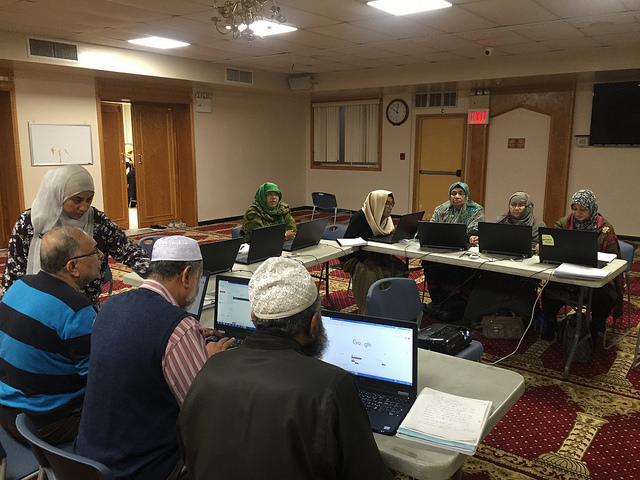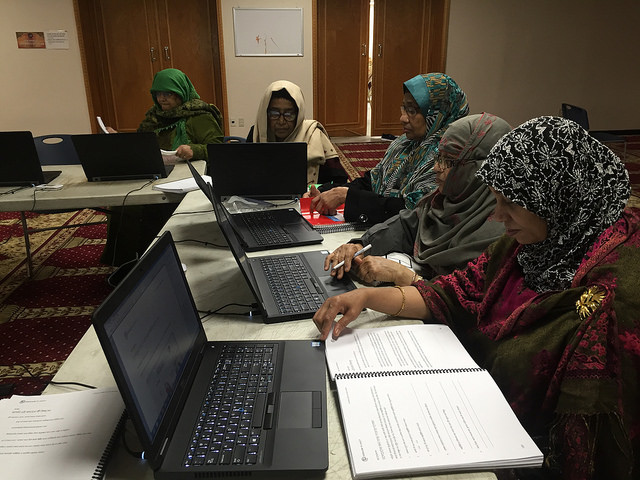This post originally appeared on the India Home blog.
Until eight weeks ago, Rabeya Khanom had never used the internet. “I didn’t know anything about it,” she told me. She had just said goodbye to her computer teacher at India Home’s Desi Senior Center and was feeling a mix of emotions. Sadness because the free 8-week long computer class was ending. But also happiness because, as she pointed out, she could now, “email, and send photographs, buy ticket from travel sites, book hotel.”
Rabeya Khanom, 72, is a student with eight other Bangladeshi seniors in the free computer classes offered by India Home, in partnership with OATS, an award winning New York City nonprofit (the acronym stands for Older Adults Technology Services). OATS provides free tech training for seniors.
“We wanted to be responsive to the unique needs of each site we partner with,” Alex Glazebrook told me. He is the Director of Technology and Training at OATS. Most of the seniors at the Desi Senior Center are immigrants from Bangladesh, hence OATS hired a Bengali speaking computer teacher, Umme Mahmud, to teach the classes.
Council Member Rory Lancman’s Grant Helps Teach Computers in Bengali
A grant from Council Member Rory Lancman, who represents New York’s District 24, helped to pay for the teacher. “In today’s interconnected world, we need to empower as many people as possible with the skills needed to use modern technology, especially senior citizens. I am incredibly proud to provide OATS funding to the Desi Senior Center to enable local seniors to take part in computer classes this year.” Lancman emailed.
Thanks to Council Member Lancman’s grant, OATS was also able to translate the manual used in the classes into Bengali. An effort, Glazebrook acknowledged, “was not an easy undertaking.” Still, everyone involved felt that a manual in Bengali was necessary for this demographic since, as Glazebrook noted “Language is a huge barrier to getting online.”

Barriers to learning
When it comes to older adults and technology though, language is only one of the barriers.
In 2016, Pew Research Center reported that while fully 87% of seniors living in households earning $75,000 or more a year say they have home broadband, just 27% of seniors whose annual household income is below $30,000 are online. Many of the seniors at the Desi Senior Center are immigrant seniors, below poverty, and Low English Proficient. For them, the free computer training offered by Desi Senior Center and OATS opens up a world that they would not have access to otherwise.
When I visited the class, the seniors were seated around rectangular tables in a red-carpeted room. The women were on one side and the men on another, in keeping with Muslim customs. As the elders stared intently at the screens of their laptops, Umme Mahmud, the instructor, helped the seniors to look for travel sites on the internet. She was teaching them how to find cheap tickets, something that would come in useful to find flights in the future, for instance, to Bangladesh.
Learning Practical Skills
The OATS curriculum aims to help seniors harness the power of technology toward achieving practical outcomes. “ I teach them how to research medical insurance, find answers to medical questions, email, read the news,” Ms. Mahmud said. They learn the basic technological skills that could be applied to their daily lives. A majority of the seniors around the table were highly educated, and many had college degrees from Bangladesh. But they felt left out of modern methods of communication. Some seniors didn’t even know how to retrieve text messages. But, Ms. Mahmud said, because they are eager to learn, they learn quickly. “It is my hope that the seniors who participated in these classes will now be able to access the digital world right at their fingertips,” Councilmember Lancman wrote.
The seniors at the Desi Senior Center sure seemed headed that way. Sukhtar Begum had recently started to read the Koran on line. Another student, Mohammad Haque, 70, rattled off the names of his favorite newspapers in Bengali, “Jugaltok, Probash, Aajkal.”
Abdul Mannan, 62, has gone a step farther: “I never used email, but yesterday I sent an email by myself.” He smiled and shrugged. “To the teacher, but I sent email,” he said.

Increased confidence and self-worth
The classes are doing more than just teaching these elders practical skills; their attempt at mastering technology was making an enormous difference in their lives in other profound ways. Ask Ms. Khanum, the 72 year old OATS alumuna. “If I need something,” she said, referring to searching the internet. “I don’t have to bother no one at home.” The confidence in her abilities had clearly increased as a result of the classes.
Ms. Mahmud pointed out an even more valuable benefit of the classes. “All their connections are back home in Bangladesh. Their past, their entertainment, everything is in Bangladesh. Older people get depressed so easily, sometimes they feel that they have no value.” But with these classes things had changed, she said.
“Now they feel connected with the world.”
Computers for the computer classes were generously funded through the New York City Department of the Aging (DFTA) at the discretion of DFTA Commissioner Dr. Donna Corrado.
The opinions expressed in this article are those of the author and do not necessarily reflect those of the Diverse Elders Coalition.

